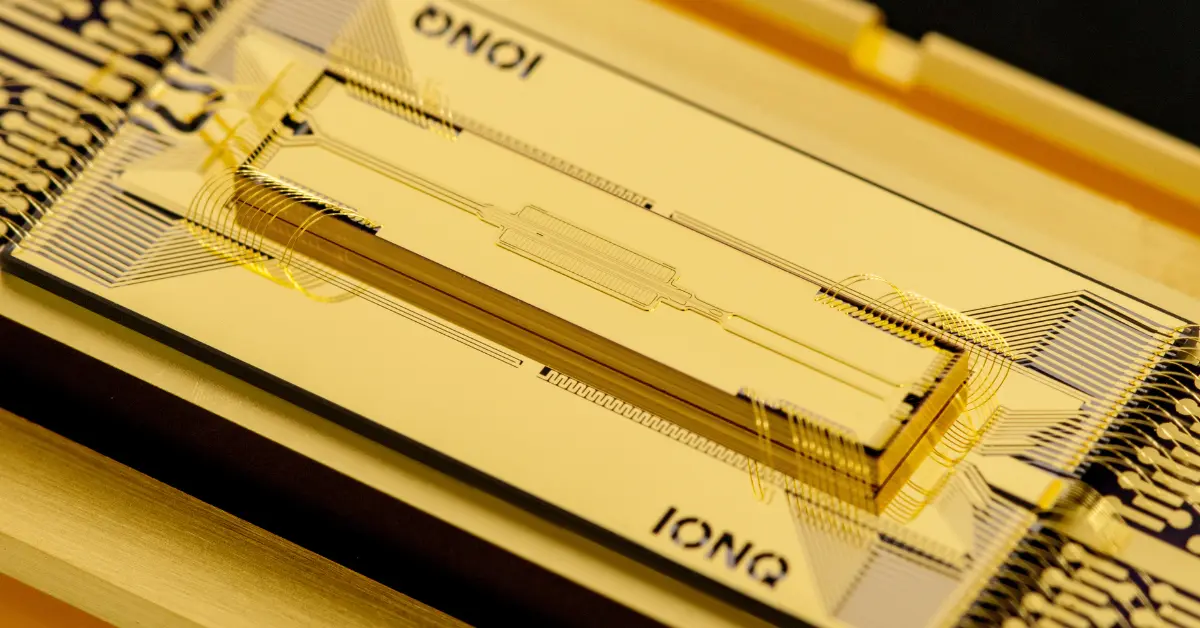IonQ
Image Credit: IonQ
In a quiet university lab, two physicists were tinkering with something that could change the world. They weren’t building a faster computer or a better smartphone. No, Jungsang Kim and Chris Monroe had their eyes set on something far more ambitious: quantum computing. Their journey led to the birth of IonQ, a company now leading the charge in this futuristic field. But how did they get here? And why does IonQ matter in the race for quantum supremacy? Let’s dive into the story of one of the most exciting players in quantum computing today.
From University Research to Quantum Startup
It all started with a question: What if trapped ions could be the key to building powerful quantum computers? Monroe, a physicist at the University of Maryland, had been working on trapped-ion quantum computing for years. Unlike traditional computers that use bits (which can be either 0 or 1), quantum computers use qubits. These can exist in multiple states at once, thanks to a phenomenon called superposition. This allows quantum computers to perform calculations at speeds unimaginable with classical systems.
Kim, an engineer from Duke University, joined forces with Monroe, and in 2015, they co-founded IonQ. Their goal? To commercialize trapped-ion quantum technology and make quantum computing more accessible.
IonQ’s Early Breakthroughs
IonQ didn’t waste time making a name for itself. While other companies like IBM and Google were exploring superconducting qubits, IonQ focused on trapped ions. The advantage? Trapped ions are naturally identical, making them highly stable and less prone to errors—a critical factor in building practical quantum computers.
By 2018, IonQ had built one of the most powerful quantum processors in the world. Unlike superconducting qubits, which require ultra-cold temperatures, trapped ions can be controlled using lasers in a vacuum chamber. This approach allows for longer coherence times, meaning the qubits can maintain their quantum states longer, leading to more accurate calculations.
The Commercial Leap: IonQ Goes Public
2021 was a landmark year for IonQ. The company made headlines when it became the first publicly traded pure-play quantum computing company, listed on the New York Stock Exchange. This move wasn’t just about raising capital—it signaled to the world that quantum computing was no longer a theoretical pursuit but a viable industry.
With the backing of major investors like Bill Gates and Amazon Web Services, IonQ expanded its research and development, pushing the limits of what quantum computers could achieve. The company’s cloud-accessible quantum processors became available on platforms like AWS, Microsoft Azure, and Google Cloud, allowing businesses and researchers to experiment with quantum algorithms.
The Power of Trapped-Ion Quantum Computing
So, what makes IonQ’s approach unique? Unlike superconducting quantum computers, which require complex fabrication processes, IonQ’s trapped-ion qubits are derived from ytterbium atoms. These atoms are manipulated using precise laser pulses, creating highly stable qubits that can be interconnected with high fidelity.
This method offers several advantages:
- Higher fidelity: Trapped ions have lower error rates compared to superconducting qubits.
- Scalability: IonQ’s modular approach makes it easier to add more qubits without a drastic redesign.
- Longevity: Qubits in IonQ’s systems remain coherent for longer, allowing for more complex computations.
IonQ’s Impact on Industries
Quantum computing isn’t just an academic exercise—it has real-world applications. IonQ is already partnering with industries to explore how quantum technology can transform everything from logistics to pharmaceuticals. Some notable applications include:
- Drug discovery: Quantum simulations can help researchers understand molecular interactions at an atomic level, speeding up the development of new medicines.
- Optimization problems: Quantum algorithms can optimize supply chains, reducing costs and improving efficiency for global logistics companies.
- Financial modeling: Quantum computing can enhance risk assessment models, helping financial institutions make more accurate predictions.
The Road Ahead: What’s Next for IonQ?
As of today, IonQ is continuously improving its quantum processors. The company is focused on increasing the number of qubits while maintaining high error correction standards. With advancements in quantum error correction and new partnerships with tech giants, IonQ is well-positioned to lead the next wave of quantum innovation.
The ultimate goal? Achieving quantum advantage—a point where quantum computers outperform classical computers for practical tasks. While we’re not there yet, IonQ’s progress suggests that we may be closer than we think.
A New Era of Computing Is on the Horizon
Quantum computing is no longer a far-off dream—it’s happening now, and IonQ is at the forefront of this revolution. From its humble beginnings in university labs to becoming a publicly traded quantum powerhouse, IonQ’s journey is a testament to human ingenuity and persistence.
So, the next time you hear about breakthroughs in quantum computing, remember the name IonQ. Because in the race toward a quantum-powered future, they’re not just competing—they’re leading the charge.






